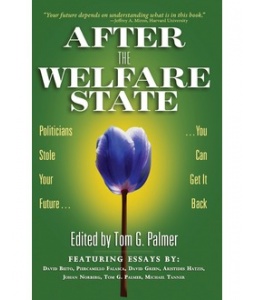Links, Libertarianism
After the Welfare State
 The welfare state is a relatively recent historical phenomenon. How did individuals and societies meet the needs of the poor before its emergence? And how might they deal with those needs in the future, if the welfare state should fall?
The welfare state is a relatively recent historical phenomenon. How did individuals and societies meet the needs of the poor before its emergence? And how might they deal with those needs in the future, if the welfare state should fall?
Those questions are explored in a new book, After the Welfare State, edited by Tom Palmer and published by Students for Liberty, a group the praises of which I have sung before. It includes a terrific essay by David Beito, whose pathbreaking work on mutual aid societies in the United States should be required reading for those interested in classical liberalism and issues of social welfare (for the gist, see his short article here). Other essays by Michael Tanner, Johan Norberg, and several by Tom Palmer himself, analyze the current crisis of the welfare state and the moral and economic principles that should guide us in moving forward.
Some of us here at BHL have suggested that, in principle, some form of state-based provision for the needs of the poor might not be impermissible on classical liberal grounds: see, for instance, here, and here. But whether the welfare state can be justified in principle is an entirely separate question from whether it can be judged in fact. And in fact, the welfare state has often produced disastrous unintended consequences. As Tom Palmer writes,
The poor suffer the worst when their very poverty is both perpetuated by the welfare state and deepened by the hidden transfers from the powerless to the powerful caused by protectionism, licensing, and other restrictions on labor market freedom that the powerful and educated create at the expense of the voiceless and disempowered (8).
For more, get yourself a PDF of the entire book, absolutely free, right here. Or, for just a taste, check out this video:
http://www.youtube.com/watch?feature=player_embedded&v=3jTkCfT61Us

